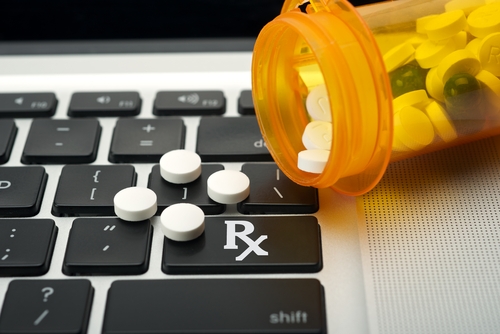
The US President’s declaration of a public health emergency in regards to the country’s opioid epidemic will do “little to help” tackle the rise of counterfeit opioids containing fentanyl, SecuringIndustry has been told.
In an exclusive interview, Libby Baney, founder and executive director at the Alliance for Safe Online Pharmacies (ASOP), told SecuringIndustry the public health emergency declaration was a “step in the right direction” but more work in combatting the emerging threats of bogus online pharmacies and fake pills laced with illicit fentanyl was needed in the response to the opioid epidemic.
Last week, US President Donald Trump made the long-awaited announcement of declaring the US opioid epidemic – which claimed more than 64,000 lives last year – a public health emergency.
The memorandum said: “It shall be the policy of the United States to use all lawful means to combat the drug demand and opioid crisis currently afflicting our country… The heads of executive departments and agencies, as appropriate and consistent with law, shall exercise all appropriate emergency authorities, as well as other relevant authorities, to reduce the number of deaths and minimise the devastation the drug demand and opioid crisis inflicts upon American communities.”
However, the President fell short of declaring the epidemic a national emergency, which he had been recommended to announce and which he had previously hinted he would do. Such an action would have released federal money and resources to tackle the problem. But instead, Trump chose to declare a public health emergency, which only redirects resources and would require any new money to be allocated by Congress.
“The emergency declaration does little to help immediately address the problem of counterfeit opioids,” Baney said. “As the Department of Justice just found as part of a recent indictment, these dangerous products are being sold online and shipped into the US via the US Postal Service. As announced, the declaration does nothing to directly address illegal online pharmacies nor does it provide new government resources to better police small packages coming into the US.”
She added: “By all accounts, tackling the opioid epidemic will necessitate increased funding for prevention, treatment, recovery and enforcement. The public health emergency declaration is a step in the right direction but more still needs to be done… Additional funds must be included to help continue to form and execute on a comprehensive and co-ordinated response to the epidemic.”
The opioid epidemic began in the 1990s following a dramatic rise in opioid pain medication prescriptions. After a crackdown, addicts turned to cheaper and stronger heroin but in the past few years overdoses and deaths from opioids have ballooned because of the influx of the synthetic opioid illicit fentanyl, which is 50 to 100 times stronger than morphine.
While fentanyl is licensed as an approved drug for the treatment of severe pain, the production of illicit fentanyl has increased. For the most part it is produced in China and Mexico and then smuggled into the US. According to Trump’s memorandum, the amount of fentanyl seized by Customs and Border Protection increased more than 200 times between 2013 and 2016.
According to the DEA, illicit fentanyl is being sold as adulterated heroin but is also becoming “increasingly available” in the form of counterfeit prescription opioids, with users often not aware that the pills have been laced with fentanyl. The DEA believe fentanyl-laced counterfeit opioids are exacerbating the epidemic.
The dark web is a common source for accessing illicit fentanyl but bogus online pharmacies selling counterfeit fentanyl-laced prescription pills without the need for a prescription are a growing concern.
In September, the Interpol-led Operation Pangea X took down 3,584 illegal websites and more than 3,000 online adverts for illicit pharmaceuticals. Seizures of fentanyl purchased from illicit online pharmacies occurred in several countries with numerous websites exclusively selling the drug closed down.
There are fears that a further crackdown on prescription opioid abuse will push more people to the internet and fake pharmacies to access drugs they think are legitimate but are in fact counterfeit and potentially laced with fentanyl. “The fact that illegal online pharmacies are so easy to find is a big problem and runs counter to all the efforts of public health organisations and law enforcement to curb opioid abuse,” Baney said.
She added that it was imperative that the issue of counterfeit opioids and illegal online pharmacies needed to be addressed. “We need to push for responsible stewardship of content on social media as well as increased detection and enforcement. Additionally, we must continue to educate policymakers, healthcare providers, patients, and caregivers about the risks of illegal online pharmacies and provide tools to help patients access medicines safely.”
However, Baney was optimistic that the public health declaration will provide some momentum in starting to address the online threat and she believed Congress was starting to wake up to, and beginning to take more of an interest in, the threat that online sites pose in the opioid crisis.
For instance, she was hopeful that Congress would now pay more attention to US Food and Drug Administration commissioner Scott Gottlieb, who has called for increased resources and authorities to increase enforcement of small packages and illegal online drug sellers shipping counterfeit medicines, which enter the country through international mail facilities through traditional postal shippers.
She was also hopeful that Congress will listen to calls from the former Secretary of Homeland Security Tom Ridge and the Americans for Securing All Packages Coalition to pass the STOP Act, which would require advanced electronic shipment data for all packages entering the US using a foreign postal service.
“The fact is the US gives advanced shipment info to China but we don’t require the same info from the Chinese in return. That makes no sense, especially at a time when the DOJ just indicted two Chinese nationals for selling fentanyl and other dangerous analogues via the internet,” Baney said. “I hope now Congress will be further motivated to take up this important legislation.”
©
SecuringIndustry.com





